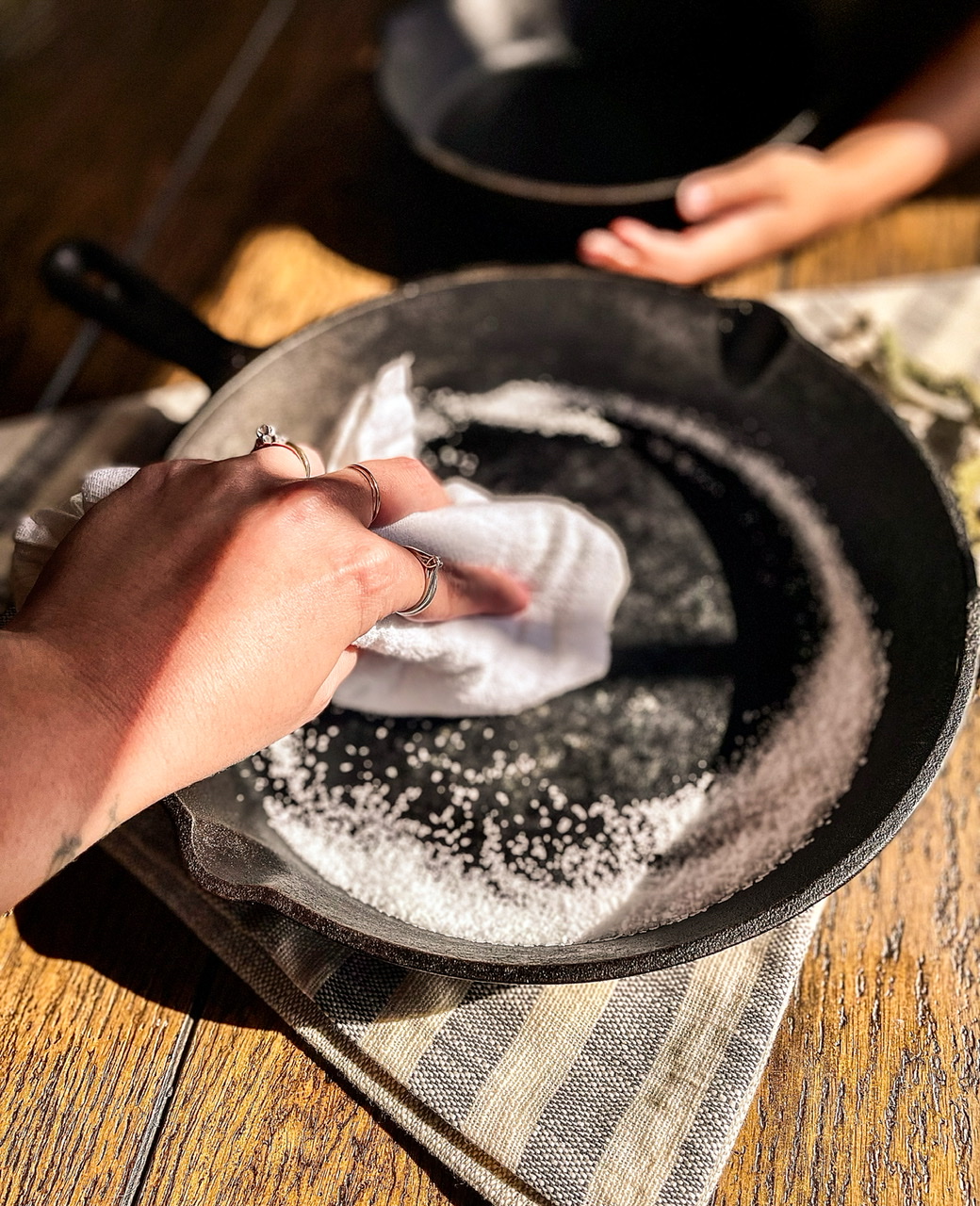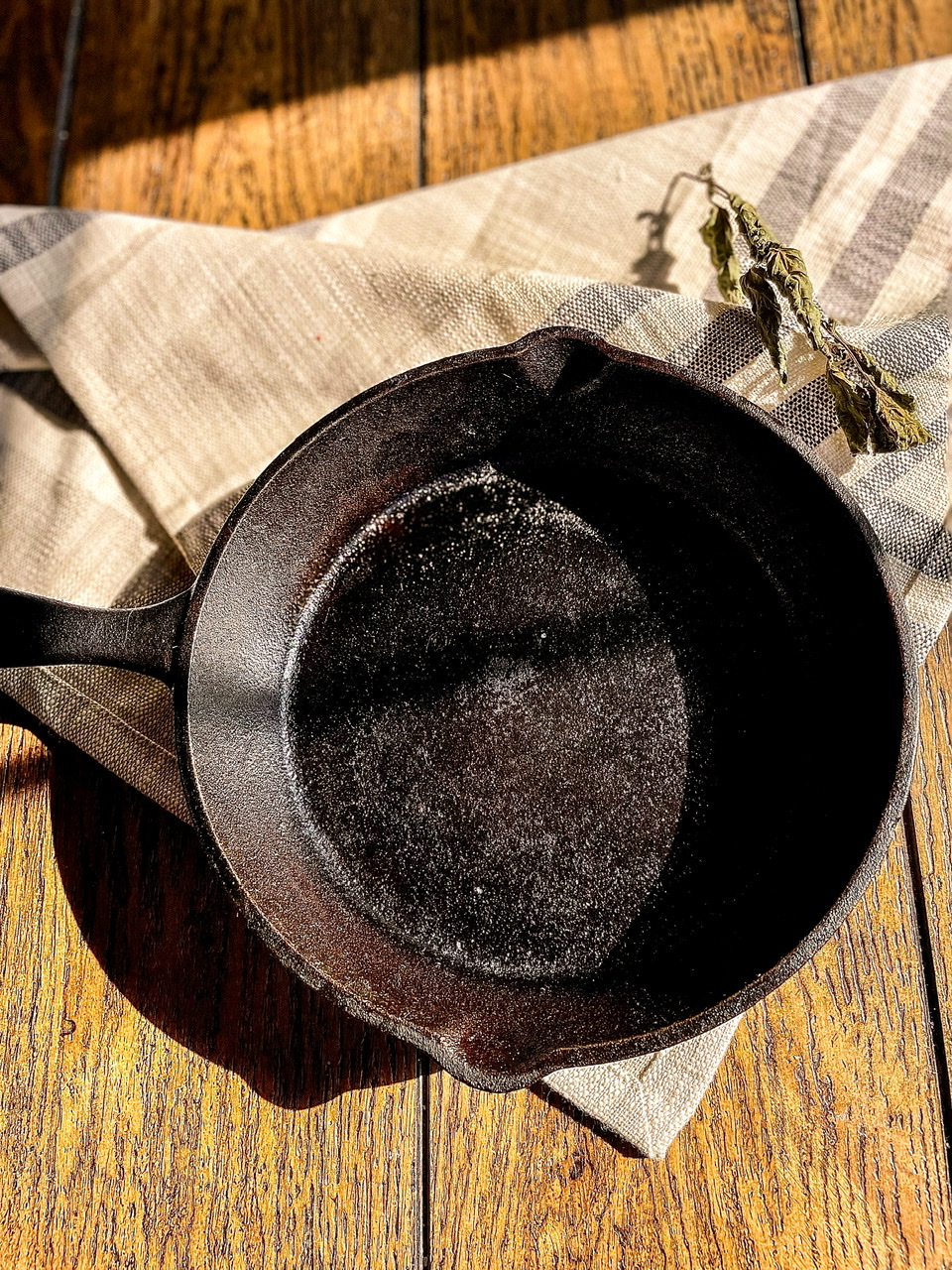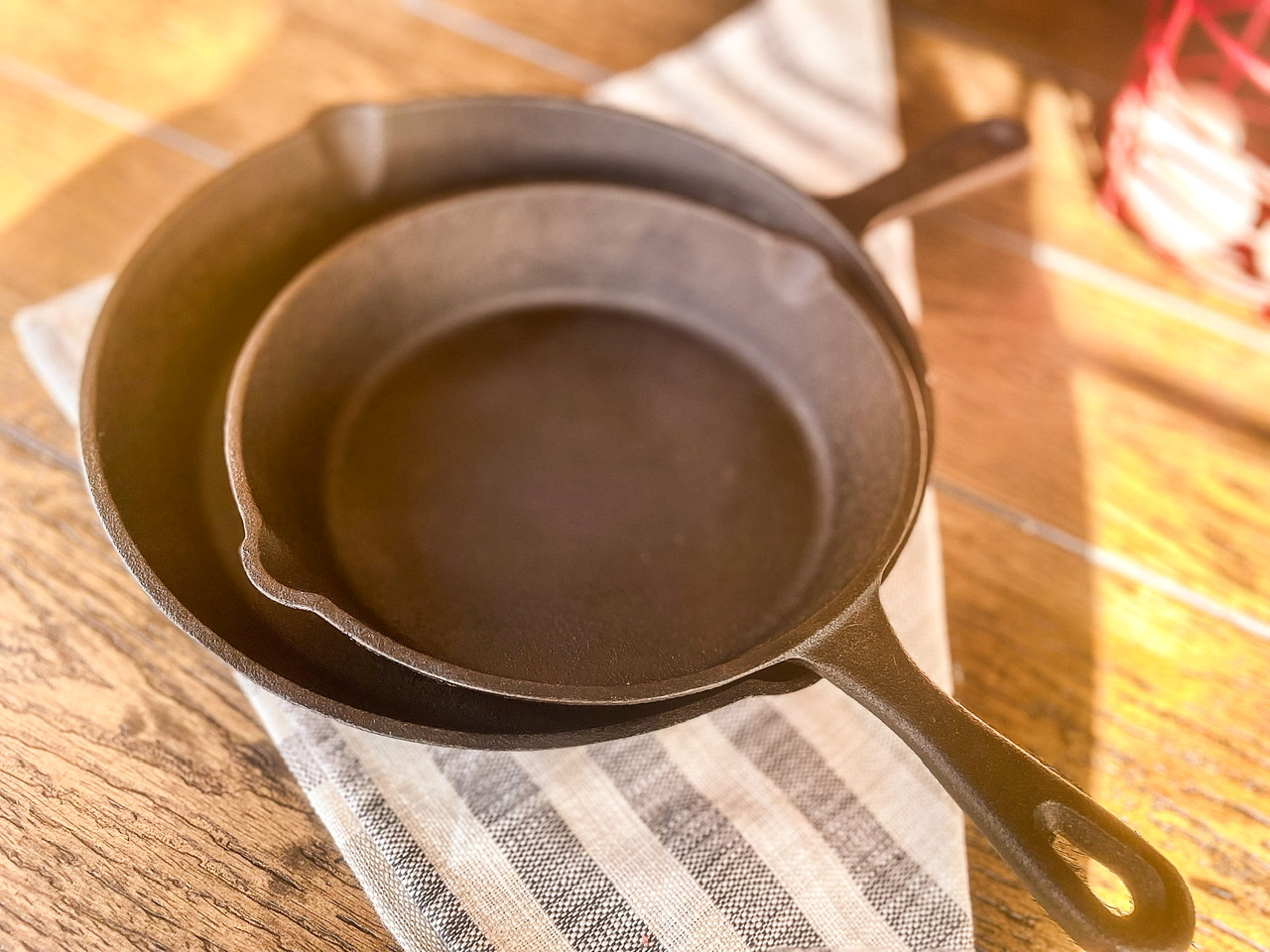A cast iron skillet is a kitchen essential. They are durable, inexpensive, and, if properly cared for, will last a lifetime. Cast iron skillets need to be seasoned before first use and then reseasoned periodically to maintain their non-stick surface. Seasoning is simply the process of bonding fat to the skillet to create a natural non-stick surface.
Why use cast iron?
Cast iron skillets conduct heat evenly and retain heat well, making them ideal for cooking at high temperatures. They can be used on any cooking surface, including induction cooktops. Cast iron skillets are also versatile – they can be used for baking, frying, sautéing, and more.
What should I avoid when cleaning my cast iron?
When it comes time to clean your cast iron cookware, there are a few things to keep in mind. One of the great things about using cast iron it’s longevity if cared for properly.
First, never soak your skillet in water. Water is the sworn enemy of cast iron and will cause it to rust. If your skillet is particularly dirty, you can scrub it with hot water and an abrasive material, but be sure to dry it immediately afterward.
Second, it’s best to avoid using commercial cleaners as they can strip away the seasoning. A commercial cleaner is simply referring to any kind of cleaning product that you would buy from the store. These products may be great for cleaning your typical nonstick pans but strip the seasoning off of cast iron and may cause your cookware to rust.
Cast iron skillets are also susceptible to damage from the dishwasher, so it’s best to hand wash them. And, if you must use soap, only use a little! Soap will strip away the seasoning on your skillet, which is what gives it that non-stick surface.
A good rule of thumb is if it’s not something you would eat, don’t use it to clean your skillet. Soap, detergent, and even some dishwashing liquids can contain chemicals that can be harmful if ingested.
Lastly, always dry your skillet immediately after cleaning to prevent rusting.
Now that we know what NOT to do, let’s talk about some effective methods for cleaning your cast iron skillet.
Commercial methods to clean cast iron
There are a few good commercial cleaners on the market that are specifically designed for cast iron. Some soaps were definitively created to clean cast iron. These products include soaps from Caron and Ducet and Kohler. These cleaners will not strip away the seasoning, and they make quick work of stuck-on food. For best results, follow the instructions on the packaging.
Popular opinion has always been that you should NEVER use commercial soaps on cast iron. There is a grain of truth to this; as previously stated, soap does take off the seasoning and can cause your pots and/or pans to rust. However, if you need to use a little drop of soap, you won’t be destroying your cast iron. Simply make sure to re-season after cleaning.
Natural methods to clean cast iron

If you prefer to use natural methods or you just don’t have a commercial cleaner on hand, there are other ways to clean your cast iron. In fact, you probably already have items you can use to clean directly in your kitchen.
My favorite way to clean cast iron is to sprinkle coarse salt onto the skillet and then scrub with a damp paper towel or sponge. This technique is great for removing stuck-on food and is fairly economical as almost everyone has salt in their kitchen.
Don’t have any salt? Another great scrub is to make a paste out of baking soda and water and use that to clean your skillet. This method can also be used to scrub off stubborn, stuck-on food while also deodorizing your pan.
You can, of course, buy products, such as chainmail scrubbers, that help make quick work of stuck-on food and don’t damage your cookware. However, scrubbing with either salt or baking soda is a gentler, cheaper way to go.
Once you have used one of these methods to remove any leftover food, rinse the skillet with hot water and then dry it thoroughly with a clean towel. You may notice some residual rust after cleaning but don’t worry, this can be removed easily by rubbing oil into it with a clean cloth.
How to season your cast iron
Seasoning your cast iron is really fairly straight-forward. It’s important to do this before using your skillet for the first time and periodically thereafter to maintain the non-stick surface.
The process of seasoning cast iron involves coating it with a layer of fat (usually vegetable oil or flaxseed oil) and then heating it until the fat polymerizes. This creates a barrier between the metal and whatever you’re cooking in the pan, which helps to prevent sticking and rusting.
There are two methods for seasoning cast iron: the oven method and stovetop method.
Oven Method:
- Preheat oven to 400-500 degrees Fahrenheit.
- Rub a thin layer of oil all over the skillet, making sure to get into all the nooks and crannies.
- Place a foil-lined baking sheet on the lower wire rack to catch any drips and then place the skillet in the oven.
- Place skillet upside down on the top wire rack in the oven so that any excess oil can drip off during seasoning.
- Bake for 1 hour.
- Turn off oven and let skillet cool inside until it’s safe to handle.
- Wipe out any excess oil with a paper towel or clean cloth before using or storing.
Stovetop Method:
- Place skillet on the burner and turn the heat up to medium-high.
- Rub a thin layer of oil all over the skillet, making sure to get into all the nooks and crannies.
- Heat the skillet for 10 minutes, then turn off heat and let it cool until it’s safe to handle.
- Wipe out any excess oil with a paper towel or clean cloth before using or storing.
Whichever method you choose, be sure to season your cast iron regularly to maintain the non-stick surface and prevent rusting.
Storing Your Cast Iron Skillet

Once your skillet is clean and dry, it’s time to store it. The best way to store cast iron is in a dry, cool place. Humidity and drastic changes in temperature can cause cast iron to rust, so avoid storing it near the stove or in the fridge.
If you have multiple cast iron skillets, it’s best to stack them with something in between to prevent any scratches. A clean dish towel or piece of wax paper will do the trick.
Just to recap…
- Do season your skillet before use and periodically thereafter to maintain the non-stick surface.
- Do not soak your skillet in water as this will cause it to rust.
- Do hand wash your skillet instead of using the dishwasher.
- Do not use a lot of soap when cleaning your skillet as this will strip away the seasoning. If you must, just a drop will do.
- Do store your skillet in a dry, cool place to avoid rusting.
- Do stack multiple skillets upside down on top of each other to save space with a barrier placed in between to prevent scratching.
And that’s it! With just a little bit of care, your cast iron skillet will last you a lifetime. Happy cooking!




